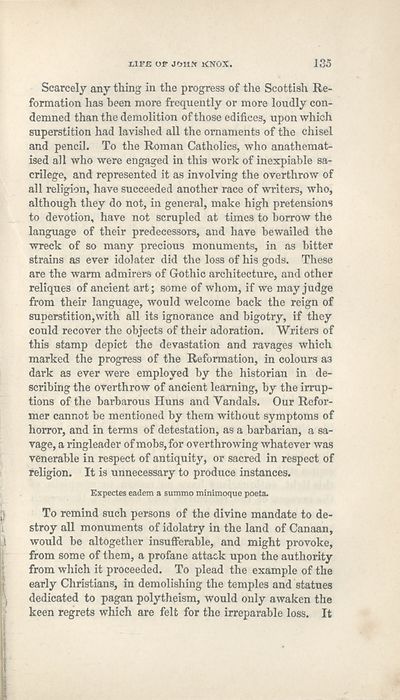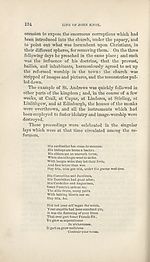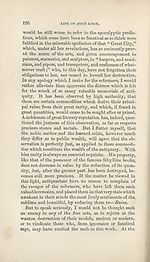Download files
Complete book:
Individual page:
Thumbnail gallery: Grid view | List view

LIFE OF JOHN KNOX. 135
Scarcely any thing in the progress of the Scottish Re¬
formation has been more frequently or more loudly con¬
demned than the demolition of those edifices, upon which
superstition had lavished all the ornaments of the chisel
and pencil. To the Roman Catholics, who anathemat¬
ised all who were engaged in this work of inexpiable sa¬
crilege, and represented it as involving the overthrow of
all religion, have succeeded another race of writers, who,
although they do not, in general, make high pretensions
to devotion, have not scrupled at times to borrow the
language of their predecessors, and have bewailed the
wreck of so many precious monuments, in as bitter
strains as ever idolater did the loss of his gods. These
are the warm admirers of Gothic architecture, and other
reliques of ancient art; some of whom, if we may judge
from their language, would welcome back the reign of
superstition,with all its ignorance and bigotry, if they
could recover the objects of their adoration. Writers of
this stamp depict the devastation and ravages which
marked the progress of the Reformation, in colours as
dark as ever were employed by the historian in de¬
scribing the overthrow of ancient learning, by the irrup¬
tions of the barbarous Huns and Vandals. Our Refor¬
mer cannot be mentioned by them without symptoms of
horror, and in terms of detestation, as a barbarian, a sa¬
vage, a ringleader of mobs, for overthrowing whatever was
venerable in respect of antiquity, or sacred in respect of
religion. It is unnecessary to produce instances.
Expectes eadem a summo minimoque poeta.
To remind such persons of the divine mandate to de¬
stroy all monuments of idolatry in the land of Canaan,
would be altogether insufferable, and might provoke,
from some of them, a profane attack upon the authority
from which it proceeded. To plead the example of the
early Christians, in demolishing the temples and statues
dedicated to pagan polytheism, would only awaken the
keen regrets which are felt for the irreparable loss. It
Scarcely any thing in the progress of the Scottish Re¬
formation has been more frequently or more loudly con¬
demned than the demolition of those edifices, upon which
superstition had lavished all the ornaments of the chisel
and pencil. To the Roman Catholics, who anathemat¬
ised all who were engaged in this work of inexpiable sa¬
crilege, and represented it as involving the overthrow of
all religion, have succeeded another race of writers, who,
although they do not, in general, make high pretensions
to devotion, have not scrupled at times to borrow the
language of their predecessors, and have bewailed the
wreck of so many precious monuments, in as bitter
strains as ever idolater did the loss of his gods. These
are the warm admirers of Gothic architecture, and other
reliques of ancient art; some of whom, if we may judge
from their language, would welcome back the reign of
superstition,with all its ignorance and bigotry, if they
could recover the objects of their adoration. Writers of
this stamp depict the devastation and ravages which
marked the progress of the Reformation, in colours as
dark as ever were employed by the historian in de¬
scribing the overthrow of ancient learning, by the irrup¬
tions of the barbarous Huns and Vandals. Our Refor¬
mer cannot be mentioned by them without symptoms of
horror, and in terms of detestation, as a barbarian, a sa¬
vage, a ringleader of mobs, for overthrowing whatever was
venerable in respect of antiquity, or sacred in respect of
religion. It is unnecessary to produce instances.
Expectes eadem a summo minimoque poeta.
To remind such persons of the divine mandate to de¬
stroy all monuments of idolatry in the land of Canaan,
would be altogether insufferable, and might provoke,
from some of them, a profane attack upon the authority
from which it proceeded. To plead the example of the
early Christians, in demolishing the temples and statues
dedicated to pagan polytheism, would only awaken the
keen regrets which are felt for the irreparable loss. It
Set display mode to:
![]() Universal Viewer |
Universal Viewer | ![]() Mirador |
Large image | Transcription
Mirador |
Large image | Transcription
| Antiquarian books of Scotland > Scotland/Scots > Life of John Knox ; and, The life of Alexander Henderson > (153) |
|---|
| Permanent URL | https://digital.nls.uk/131834140 |
|---|
| Description | Thousands of printed books from the Antiquarian Books of Scotland collection which dates from 1641 to the 1980s. The collection consists of 14,800 books which were published in Scotland or have a Scottish connection, e.g. through the author, printer or owner. Subjects covered include sport, education, diseases, adventure, occupations, Jacobites, politics and religion. Among the 29 languages represented are English, Gaelic, Italian, French, Russian and Swedish. |
|---|

